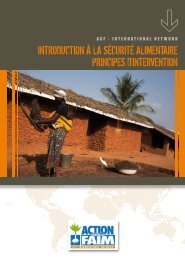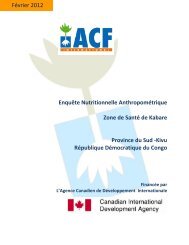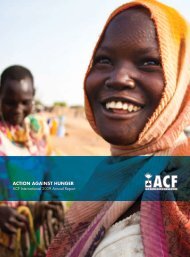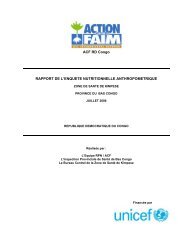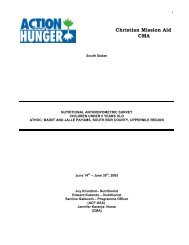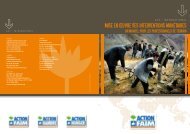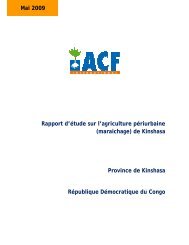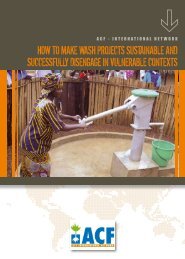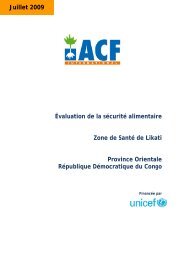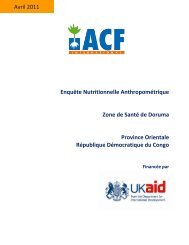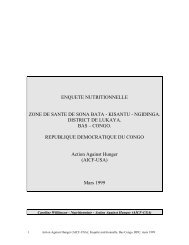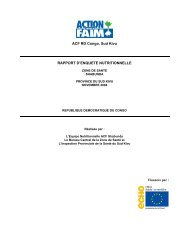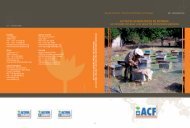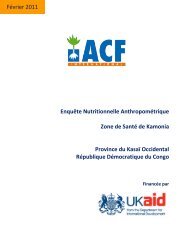Burundi - Action Against Hunger
Burundi - Action Against Hunger
Burundi - Action Against Hunger
- No tags were found...
You also want an ePaper? Increase the reach of your titles
YUMPU automatically turns print PDFs into web optimized ePapers that Google loves.
Case Study <strong>Burundi</strong><strong>Burundi</strong> is just one of the many countries where <strong>Action</strong> <strong>Against</strong><strong>Hunger</strong> works. Let’s learn a little about this East African country.Geography:Wedged between Tanzania, theDemocratic Republic of the Congo,and Rwanda in east-central Africa,<strong>Burundi</strong> occupies a high plateaudivided by several deep valleys. It isequal in size to Maryland.History:The population of <strong>Burundi</strong> isprimarily comprised of two groupsof people: the Hutu (approximately85%) and the Tutsi (approximately14%). The Twa people, a Pygmytribe, make up 1% of the population.Historically, Hutu life relied on smallscale agriculture and a clan-basedsocial system until the Tutsi firstarrived in the 14th century.The Tutsi gradually gained controlof the Hutu dominated regionthrough a mostly peaceful infiltration.DemocraticRepublic ofCongoRwandaOur ProgramsWater and SanitationNutritionFood SecurityNgoziKayanzaBubanzaBujumbura<strong>Burundi</strong>RuyigiTanzaniaWith their advanced knowledge ofwarfare and their possession ofcattle, the Tutsi were able toestablish a feudal relationship withthe Hutu under a Tutsi mwami, orKing, who ruled by divine right.The Hutu and the Tutsi livedin relative peace for centuries.However, the tide of peacefulco-existence ended with thebeginning of European colonialpartition and rule that sweptAfrica in the early 20th century.Belgium colonialized <strong>Burundi</strong>after World War I, establishing asystem of indirect rule that activelyfavored the Tutsi and pitted themagainst the Hutu. This favoritismcreated tension between the twocultures, setting the stage for thepersistent and violent conflictto come.FactsLocation: Central AfricaPresident: Pierre NkurunzizaCapital: BujumburaLanguages: Kirundi, French, SwahiliPopulation: 8,691,005Climate: Equatorial; two rainy seasons (Februaryto May and September to November), and two dryseasons (June to August and December to January)Life expectancy: 52 yearsLiteracy: (definition—age 15 and over can readand write) 60%(6)BeforeDavid and Kaifa suffering from severeacute malnutrition after years of civilconflict in <strong>Burundi</strong>.After <strong>Burundi</strong> gained its independencefrom Belgium in 1962, a series ofethnic clashes and military coupsswept the country, leading tohundreds of thousands of deaths.The frequency of ethnic clashesincreased over the course of threedecades, developing into a full-blowncivil war in 1993 instigated by theassassination of the first Hutupresident. Over 300,000 peoplewere killed, while even more wereforced to flee to neighboring countries,leaving their homes, land, andlivelihoods behind.In late 2003, the <strong>Burundi</strong>angovernment and rebel group signed acease-fire and a formal power-sharingagreement. Transitional governmentalinstitutions were established andin 2005, the people of <strong>Burundi</strong>participated in parliamentary electionsto organize the new government.Although the civil war is over, thepeople of <strong>Burundi</strong> remain engaged ina difficult struggle to stabilize theirlives and promote peace.(7)AfterDavid and Kaifa after 30 days in<strong>Action</strong> <strong>Against</strong> <strong>Hunger</strong>’s TherapeuticFeeding Center.Humanitarian situation:Today, more than 800,000 people –12% of the country’s population –remain internally displaced as a resultof the civil war. Large numbers ofinternally displaced people have beenunable to produce their own foodand are dependent on internationalhumanitarian assistance, despitethe fact that agriculture supportsover 90% of the labor force arefarmers. In addition to displacementand instability, diseases such asmalaria and HIV/AIDS are widespreadthroughout the country.Efforts to alleviate the humanitariansituation in <strong>Burundi</strong> have beenongoing since 1999 when the UnitedNations along with the EuropeanUnion, the United States and otherslaunched an initiative to promotepeace and encourage humanitarianaid in <strong>Burundi</strong>. <strong>Action</strong> <strong>Against</strong> <strong>Hunger</strong>has been working to decreasemalnutrition rates and enhance foodsecurity in <strong>Burundi</strong> since 1994,helping more than 180,000 people.



